The pending demise of Facebook (and Princeton)
« previous post | next post »
John Cannarella & Joshua A. Spechler, "Epidemiological modeling of online social network dynamics", posted on arXiv.org 1/17/2014:
The last decade has seen the rise of immense online social networks (OSNs) such as MySpace and Facebook. In this paper we use epidemiological models to explain user adoption and abandonment of OSNs, where adoption is analogous to infection and abandonment is analogous to recovery. We modify the traditional SIR model of disease spread by incorporating infectious recovery dynamics such that contact between a recovered and infected member of the population is required for recovery. The proposed infectious recovery SIR model (irSIR model) is validated using publicly available Google search query data for "MySpace" as a case study of an OSN that has exhibited both adoption and abandonment phases. The irSIR model is then applied to search query data for "Facebook," which is just beginning to show the onset of an abandonment phase. Extrapolating the best fit model into the future predicts a rapid decline in Facebook activity in the next few years.
There's been more media uptake that you might expect for a paper posted on arXiv.org by two graduate students: Adrian Cho, "Facebook Spreads—and May Die Out—Like a Disease", Science 1/22/2014; Reed Albergotti, "Controversial Paper Predicts Facebook Decline", WSJ 1/22/2014; "Is Facebook like a spreading disease that’s about to fade away? Princeton study creates stir", WSJ MarketWatch 1/22/2014; Juliette Garside, "Facebook will lose 80% of users by 2017, say Princeton researchers", The Guardian 1/22/2014; Christian Cotroneo, "Facebook Losing Users, Princeton University Study Suggests — As Many As 80 Per Cent", Huffington Post 123/2014; "Facebook Headed For Extinction", Silicon India 1/23/2014; Facebook to die out by 2017, say experts", Tehran Times 1/24/2014; etc. etc. etc.
The response — Mike Devlin, Lada Adamic, and Sean Taylor, "Debunking Princeton", published on Facebook 1/23/2014:
Like many of you, we were intrigued by a recent article by Princeton researchers predicting the imminent demise of Facebook. Of particular interest was the innovative use of Google search data to predict engagement trends, instead of studying the actual engagement trends. Using the same robust methodology featured in the paper, we attempted to find out more about this "Princeton University" – and you won't believe what we found!
In keeping with the scientific principle "correlation equals causation," our research unequivocally demonstrated that Princeton may be in danger of disappearing entirely.
Devlin et al. use results from Google Scholar to show that publication by Princeton researchers will cease by 2020:
A similar fate can be predicted for student enrollments:
Of course, Princeton University is primarily an institution of higher learning – so as long as it has students, it'll be fine. Unfortunately, in investigating this, we found a strong correlation between the undergraduate enrollment of an institution and its Google Trends index:
This trend suggests that Princeton will have only half its current enrollment by 2018, and by 2021 it will have no students at all, agreeing with the previous graph of scholarly scholarliness. Based on our robust scientific analysis, future generations will only be able to imagine this now-rubble institution that once walked this earth.
But wait — it's worse than you think:
While we are concerned for Princeton University, we are even more concerned about the fate of the planet — Google Trends for "air" have also been declining steadily, and our projections show that by the year 2060 there will be no air left:
Sean Taylor also contributed a reference to this classic xkcd:
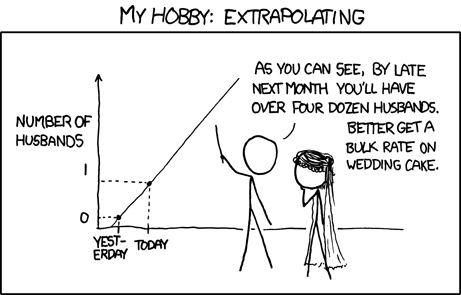
Now that's peer review!
[In fairness to the mediaverse, I need to point out that the debunking has also been widely covered, though not yet in Science or the Guardian: Josh Constantine, "Facebook Hilariously Debunks Princeton Study Saying It Will Lose 80% Of Users", TechCrunch 1/23/2014; Salvador Rodriguez, "Facebook mocks Princeton, predicts school won't have students by 2021", LA Times 1/23/2014; Brandon Griggs, "It's Facebook vs. Princeton in study smackdown", CNN 1/24/2014; Mark Prigg, "Facebook hits back at Princeton study claiming it will lose 80% of its users within a year – telling University that by same calculation it will have no students by 2021", Daily Mail 1/24/2014; etc.]
[And Will Oremus, to his credit, actually read the paper and did his own debunking: "The Myspace Fallacy", Slate 1/23/2014. He suggests the lolmythesis version: "If you assume that Facebook is like Myspace, bring in a fancy model adapted from epidemiology, and crunch the numbers, it turns out that Facebook is a lot like Myspace."]
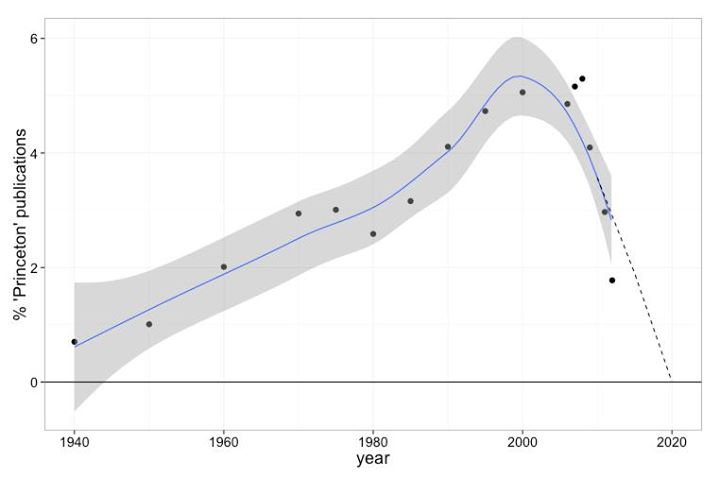
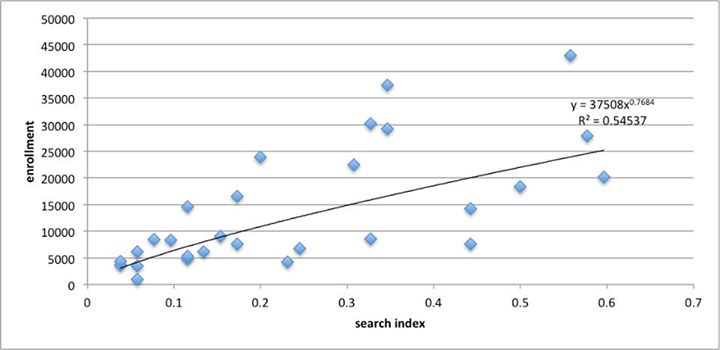
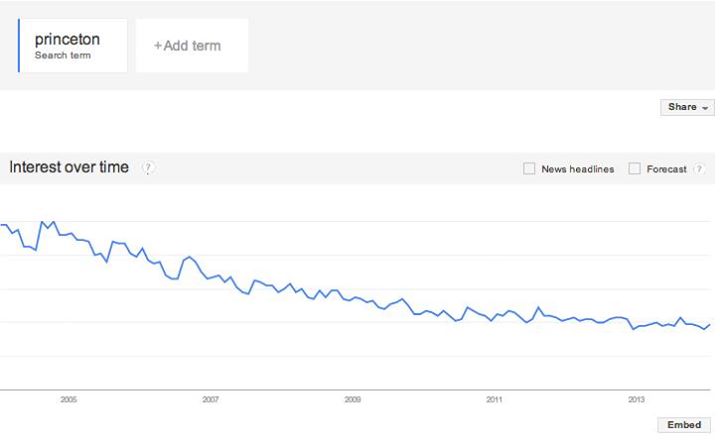
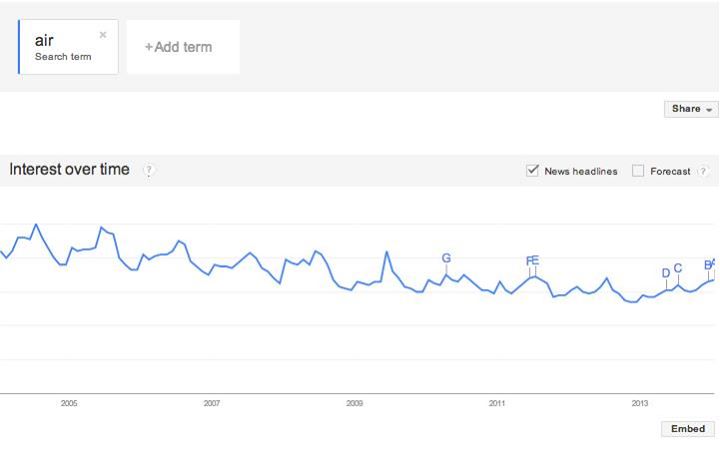
GeorgeW said,
January 25, 2014 @ 8:36 am
Could the impending demise of FaceBook and Princeton be related?
J.W. Brewer said,
January 25, 2014 @ 8:48 am
To the extent this is predicting a future in which tenured Princeton faculty are not expected either to publish or to teach undergrads, some might call that "utopia" rather than "demise."
[(myl) Ah, but university endowments are clearly heading for zero as well:
]
D.O. said,
January 25, 2014 @ 11:15 am
Not to spoil the fun, but I have to note that some models may work and others might not. Because happens.
T.L. said,
January 25, 2014 @ 1:28 pm
I haven't read Will Oremus's piece, but if he's right in pointing out that the original study begs the question then what really is the difference between MySpace and Facebook (beyond the obvious ones)?
Keith M Ellis said,
January 25, 2014 @ 3:45 pm
Surely there's more solid research on network effects (both adoption and abandonment) with regard to online social software (which could include many things, from chat apps to web communities to social games) that could allow some modeling that would arguably apply to Facebook?
It seems to me that it's obvious that Facebook isn't a priori destined to survive and if it does decline, like MySpace it will decline more rapidly than we'd expect.
peterv said,
January 25, 2014 @ 3:49 pm
And the use of diffusion models from epidemiology to model the adoption of products and services is hardly new either, having been around since the late 1950s. Do ideas take a long time to reach this "Princeton" place?
Rubrick said,
January 25, 2014 @ 4:51 pm
While the model may be inapplicable and the interpretation dubious, I think the researchers were onto something in equating abandonment of Facebook with recovery.
[(myl) No, no, the genius of their approach was to model the abandonment of a product as analogous to the spread of a disease. In their words (with my emphasis):
While the traditional SIR model captures the infectious uptake dynamics of OSNs, the assumption of a characteristic recovery rate in the traditional SIR model is of doubtful validity for modeling the abandonment of OSNs [5]. Contrary to the SIR model’s assumption of a characteristic recovery rate for diseases, OSN users do not join an OSN expecting to leave after a predetermined amount of time. Instead, every user that joins the network expects to stay indefinitely, but ultimately loses interest as their peers begin to lose interest. Thus a user that joins early on is expected to stay on the network longer than a user that joins later. Eventually, users begin to leave and recovery spreads infectiously as users begin to lose interest in the social network. The notion of infectious abandonment is supported by work analyzing user churn in mobile networks which show that users are more likely to leave the network if their contacts have left [17]. Therefore it is necessary to modify the traditional SIR model to include infectious recovery dynamics, which intuitively provide a better description of OSN abandonment.
I think the phrase "infectious abandonment" has potential, if only as a band name.]
Steve Morrison said,
January 25, 2014 @ 8:35 pm
Now me, I've always preferred this classic quote from Mark Twain to the XKCD cartoon.
Ran Ari-Gur said,
January 25, 2014 @ 9:28 pm
On the face of it, I think it makes sense that if social networks' growth can be modeled as spread of an infection, then their demise would conform to a similar model, if only because in many cases I'd expect that the demise of one social network is tied to the growth of a competitor (or multiple competitors). I expect that a majority of erstwhile MySpace users are still "infected" with one social network or another, but with finite time in the day, they can only sustain so many "infections".
Have linguists developed good models for language shift and language death? I wonder if any of those models could be applied to social networks.
Boris said,
February 4, 2014 @ 3:48 pm
Isn't it more reasonable to model a social network using Google searches than something like Princeton, which predates Google by quite a bit? Forget infectious diseases. If we find a model that explains the rise and fall of MySpace, isn't it at least possible that Facebook is following the same trajectory?
Also, by pending, do you mean impending or are there dialects where the two words are interchangeable?
Timothy Matias said,
March 25, 2014 @ 6:52 pm
This is not a debunking, it's a faulty comparison. What does the academic prestige of Princeton, or the number of Princeton publications per year, or the amount of air we have, have anything to do with social engagement? If the arguments in the paper were fallacious or misconceived, Facebook could have easily shown objectively how faulty the paper's methodology/analysis was. But when Facebook feels it necessary to deride and make liberal use of the straw man fallacy to "debunk" the paper, it really seems like a desperate attempt to discredit a study that "threatens" Facebook's reputation as the #1 social network.